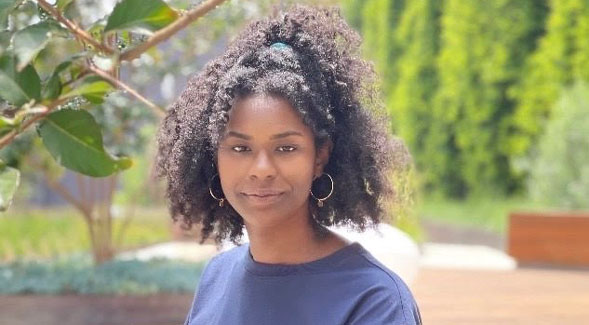Researching Health Care Disparities in Minority Communities
SDSU sustainability sophomore Azure Ciel Fisher is digging into how structural racism impacts health.

Undergrad Research Spotlight: This is part of a series on undergraduate research opportunities at SDSU and the programs that help support a future pipeline of scientists from diverse and underrepresented groups. Stories in this series include a microbiology researcher and an engineering researcher.
Inspired by experiences growing up in Los Angeles, pre-health sustainability sophomore Azure ‘Ciel’ Fisher is committed to improving health and health care among Black Americans. As a Henrietta Goodwin Scholar her freshman year at San Diego State University, Fisher received academic support and was inspired to begin her own research in an effort to bring real change to her community.
Fisher was raised in Ladera Heights, one of the most established Black communities in Los Angeles County. The unincorporated area has been home to a large number of oil rigs for years, and research is now being done to better understand the health disparities that may stem from drilling near the community’s homes. Currently, at least one person in almost every household on her street has cancer. Fisher herself lost two family members to cancer, 10 years apart, and both times families were left in the dark about the illness. These experiences inspired Fisher to dig deeper into how structural racism is impacting health care.
Fisher’s interest in the topic grew when she learned about environmental racism in an American Indian history class. She used this topic for a persuasive essay in her Rhetoric and Writing Studies 200 class last year, choosing the topic of health care disparities for ethnic minorities during the pandemic as well as future effects of this issue.
Pursuing additional research, she contacted the Black Resource Center (BRC) on campus, where she began working with Tonika Green, now BRC interim director; Rachael Stewart, administrative support coordinator in educational leadership, and Tanis Starck, director of the Office of Intercultural Relations.
Fisher, Green, Stewart and Starck are now working toward securing pathways to continue this research with a goal to one day publish Fisher’s work, which Fisher hopes to carry into graduate school one day.
“Within the Henrietta Goodwin Scholars program, we encourage the scholars to be servant-leaders,” Green said. “Azure’s research embodies this and everything she stands for challenges the system to promote equity and humanity.”
Fisher was selected as a presenter for the BRC’s inaugural Black Minds Matter Research Symposium.
The SDSU News Team spoke to Fisher about her research and future plans.
Tell us about your current research.
My current research is on how structural racism in America is the reason why the COVID-19 death rate per capita for African Americans is triple that of white Americans. The virus is not affecting the Black community because we just happen to have higher rates of hypertension, or because we just happen to work in industrialized, densely populated work environments. I want to show how it’s related to structural racism of Black people often being incorporated into low accumulating wealth, jobs that are laborious and highly populated, and how this doesn’t give these people the luxury of quitting their jobs or working at home to avoid the virus. Economics is incorporated into that situation in that many sick people refuse to go to the hospital because they couldn’t afford to, then they die at home. These financial issues, again, disproportionately affect the Black community.
How can you incorporate this into the real world?
I want to show how things are equal on paper, but not structurally through the system of America. It’s hard to see, it’s not apparent. I think we need proper education on structural racism and how it deeply impacts both the Black community and other minority groups greatly. I want it to educate how that can be possible.
We need the chance to inspire future generations to be able to succeed and know their culture and their languages for the long term of health. It was discovered that neurological symptoms were present in 55% of 60 recovered COVID-19 patients. We not only need to understand that there is structural racism and a healthcare disparity, but we need to understand that the Black community and minorities as a whole need to protect themselves to preserve culture and identity and promote Black excellence and Black success for future generations.
What does it mean to be getting the opportunity to do this type of research as an undergrad?
I feel extremely fortunate to have this opportunity. Many people say that undergraduate research isn’t common or publishable. I felt very grateful that the Black Resource Center was able to connect me with Dr. Rachael Stewart, who specifically helped me curate my ideas. I never thought I would be able to conduct research on my own.
What are your future plans?
I want to get a master’s in legal studies and environmental science. I’d like to continue this type of research along the lines of Black health and how it is being affected negatively. I want to focus on environmental science, helping health and continuing Black research health, and using a master’s in legal studies to help understand the policies within environmental science health. There are several violations in Ladera Heights, and I want to help fight that.



